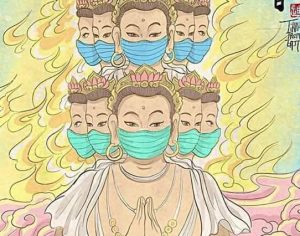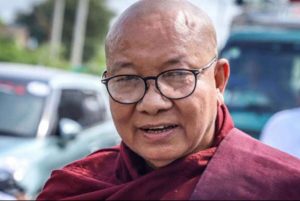Beginner’s Mind is a special project from BDG collecting insightful essays written by US college students who have attended experiential-learning courses related to Buddhism. Some of the authors identify as Buddhists, for others it is their first encounter with the Buddhadharma. All are sharing reflections and impressions on what they’ve learned, how it has impacted their lives, and how they might continue to engage with the teaching.
Allyson Rosenblum wrote this essay for her Buddhist Modernism course at the University of Southern California. Allyson is a junior majoring in Philosophy, Politics, and Law with a minor in Legal Studies. Allyson enjoys learning about Buddhism and spirituality, and hopes to attend law school after graduation.

Reflections on My Evolution in Buddhism
When I selected this course, I was hoping to expand my knowledge of Buddhism and build upon the foundational knowledge that was established in the previous course I had taken. In the earlier class, I was interested in our discussions of Buddhism and social issues, such as cultural appropriation. However, I realize now that I mostly saw Buddhism on a conceptual level, and did not yet understand its role in the greater societal picture.
The topics covered in this Buddhist Modernism course have presented this fuller picture that I was searching for, and I found it particularly fascinating to see how Buddhism changes and evolves. In the earlier stages of this class, I found that my comments in discussions often returned to what I considered to be “original Buddhism.” I had assumed that evolution in Buddhist practices meant that they were not “truly Buddhist”—for instance, when learning about socially engaged Buddhism. However, through this course, I have come to understand that it is entirely valid for a religion to grow alongside society, and that new beliefs or attitudes are not necessarily inferior to those held in centuries gone by.
This is particularly important to contemplate in conjunction with today’s emphasis on social change. Instead of viewing concepts such as socially engaged Buddhism as cultural appropriation, it is important to remember that Buddhism is a religion that anyone is welcome to practice and interpret. On the other hand, many traditional beliefs surrounding Buddhism have sexist and racist implications, and as such it is valid for religions to evolve along with social rights.
Throughout this class, I was undergoing my own mental health journey. Toward the beginning, I was diagnosed with obsessive compulsive disorder (OCD), and today I am continuing to discover more about the ways in which it affects me. During this course, my relationship with meditation changed for a period: I was scared of meditating, in fear of ruminating on my intrusive thoughts. However, with the guidance of my therapist, I have recently become comfortable with meditating once again. Although meditation feels somewhat awkward, I am hopeful that I will become increasingly comfortable with my practice.
I have been on a journey of discovery toward understanding myself mentally. During this last semester, I experienced some of the lowest mental points in my life. However, by looking inward and understanding how my mind interprets thoughts, I found greater clarity in how my mind functions than ever before. While retraining my brain, I have used many of the concepts I learned in class. For instance, I have been coming to terms with the concept of self, and understanding that my thoughts are simply thoughts.
At the beginning of the course, I found myself being very critical of the new ideas I was taking in: I tended to over-criticize the articles that we read and the authenticity of their messages. In retrospect, I now feel that this class has helped me to become more centered, and helped me to refrain from becoming too emotional within academic discussions. I have learned the value of critical thinking, but also the importance of differentiating between objective criticism and anger. This is especially important when making arguments about social issues such as cultural appropriation, because such nuanced topics are best discussed through fully formed thoughts and arguments. I came into this class with passionate feelings about manifesting social change, and I have learned how to maintain a balanced disposition while doing so.
When I chose this course, I wanted to expand my knowledge of Buddhism within the modern context, and to discover how the religion has evolved over time. Not only have I found this information, it has been presented within the greater context of the social implications that Buddhism has in multiple fields. Learning about Buddhism’s roles in areas such as ecology and education was unexpected but very interesting to consider. I enjoyed discussing how different schools of Buddhism view different topics, and even how the same schools can vary between countries and cultures.
For example, when considering the role of Buddhism in education, Sri Lanka and Thailand tend to view the practice differently. In Sri Lanka, it provides credibility to individuals in their careers, particularly for women. In Thailand, Buddhist education is seen as an opportunity for the economically disadvantaged and plays a larger role among small villages.
One question that remains for me is the prominence of newer practices, such as socially engaged Buddhism and eco-Dharma among Buddhist practitioners. I have learned that these practices exist, yet I am uncertain how prominent of a role they play. It would be interesting to understand the impact that these practices have had on Buddhism through learning how their following compares with more traditional schools, such as Theravada and Mahayana.
Additionally, I am still unsure whether some of the practices we have learned about even qualify as schools of Buddhism, or whether they are philosophies that are meant to work in conjunction with other expressions of Buddhism. I think that the discussion-based classes have encouraged me to analyze the topics we are discovering, but I feel that there is a bigger picture of which I and the students in the class may not yet be aware.
Beyond this class, I plan to continue discovering new forms of Buddhism, to better understand how the practice continues to change. Additionally, I plan to use the resources we have been provided to continue my meditation practice—particularly as a way to cope with my OCD diagnosis. For me, this class can be summarized by the term “evolution.” In my previous course I gained an understanding of the foundations of Buddhism, and many of the concepts that have prominence within the religion, philosophically. In this class, I learned how those concepts have been reinterpreted within a modern context, and the resulting social implications.
Related features from BDG
Where Did Buddhism Take You?
Learning to Engage with Buddhism
My Personal Journey











